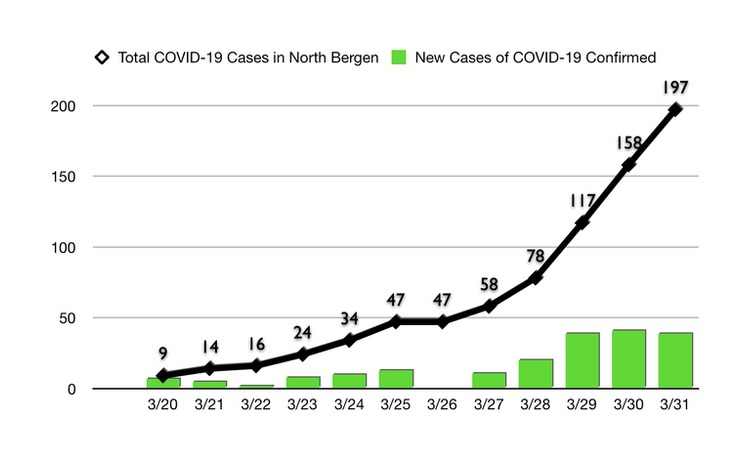Breaking News
Confirmed COVID-19 Cases Near 200 in North Bergen
On March 17th, the Township of North Bergen confirmed the first two cases of COVID-19 in the town. Following the announcement, Mayor…

On March 17th, the Township of North Bergen confirmed the first two cases of COVID-19 in the town. Following the announcement, Mayor Nicholas Sacco declared a state of emergency.
Earlier this morning, the Township of North Bergen revealed that the total amount of positive COVID-19 cases equaled 197.
How can I prevent myself from getting the virus?
To ensure the lowest chance of obtaining the virus, and spreading the virus to others, it is critical that everyone begin intensive social distancing immediately. As much as possible, limit contact with people outside your family.
Furthermore, it is recommended to do the following: avoid touching your nose, eyes, and mouth; keep your distance from people, especially those who look sick; wash your hands frequently especially before eating, after exiting a densely populated area, and after coughing and sneezing; and disinfect personal items regularly.
Can the COVID-19 virus be spread through food, including refrigerated or frozen food?
Coronaviruses are generally thought to be spread from person-to-person through respiratory droplets. Currently there is no evidence to support transmission of COVID-19 associated with food. Before preparing or eating food it is important to always wash your hands with soap and water for 20 seconds for general food safety. Throughout the day wash your hands after blowing your nose, coughing or sneezing, or going to the bathroom.
It may be possible that a person can get COVID-19 by touching a surface or object that has the virus on it and then touching their own mouth, nose, or possibly their eyes, but this is not thought to be the main way the virus spreads.
In general, because of poor survivability of these coronaviruses on surfaces, there is likely very low risk of spread from food products or packaging that are shipped over a period of days or weeks at ambient, refrigerated, or frozen temperatures.
How many people will get sick with COVID-19?
National and international organizations are working on models to estimate the number of people who will get sick, but the situation is changing rapidly. It is possible that models will underestimate the number of sick individuals because those with mild symptoms will not seek medical attention, and researchers use different methods to attempt to account for that.
In February, scenarios from the Centers for Disease Control and Prevention projected that between 160 million and 214 million people in the US could be infected over the course of the epidemic, and that as many as 200,000 to 1.7 million people could ultimately die. And, the calculations based on the CDC’s scenarios suggested, 2.4 million to 21 million people in the US could require hospitalization, which would overburden our medical system.
However, the CDC’s projected numbers did not account for steps that are being taken to slow COVID-19 spread, which is why it is critical that everyone begin intensive social distancing immediately – as much as possible, limit contact with people outside your family.















